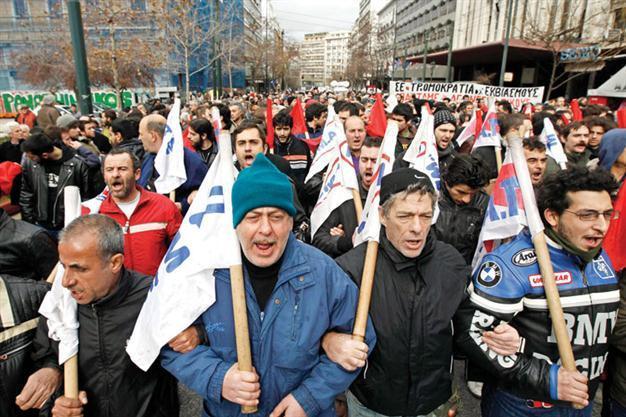Large Greek trade unions walk off as EU pressure increases
ATHENS - Reuters

Angry demonstrators march to the parliament in Athens yesterday. REUTERS photo
Greek leaders face crunch talks yesterday to secure a new international bailout and avoid a chaotic debt default, caught between EU demands that they accept painful reforms now and a national strike against more austerity.Prime Minister Lucas Papademos negotiated through most of the night with Greece’s European Union and IMF lenders, ending at 4 a.m. local time when the 24-hour strike was about to begin, closing ports and tourist sites and disrupting public transport.
Papademos, a technocrat parachuted in to lead the Greek government late last year, must persuade leaders of the three parties in his coalition government to accept the EU/IMF conditions for the 130-billion-euro rescue.
“We must find a solution today,” said one government official before the leaders’ talks, which are expected to start later in the day.
With Greece’s future in the eurozone in question, German Chancellor Angela Merkel told Athens on Feb. 6 to make up its mind fast if it would accept the deal - and its conditions of reforms to make the economy more competitive that are certain to lead to big cuts in living standards Finance Minister Evanagelos Venizelos said talks with the “troika” of lenders - the European Commission, European Central Bank and IMF - were not going well. “Unfortunately the negotiations are so tough that as soon as one chapter closes, another opens,” he said after meeting troika officials on Feb. 6 night.
Strike halts life
Early yesterday, the strike called by the private and public sector unions GSEE and ADEDY began to bite, bringing the country’s main port to a standstill.
“No ships departed from Piraeus port this morning, as a result of the seamen’s strike,” said a coast guard official.
In central Athens, tourists were locked out of the Acropolis and public transport was disrupted during the morning rush hour. State hospitals ran on a skeleton staff and teachers, bank employees and telecoms workers were due to join the action.
Greek party leaders face a general election possibly as early as April and have been reluctant to accept yet more austerity to be piled on top of a series of pay cuts, tax rises and job losses imposed since Greece’s first bailout in 2010.
After weeks of argument a number major issues have yet to be sorted out at yesterday’s talks.
Greece has yet to identify spending cut measures worth 600 million euros this year, out of a total austerity package of about 3.3 billion euros, a government official said.
The troika was also demanding that private firms’ labor costs be cut by about a fifth.
















